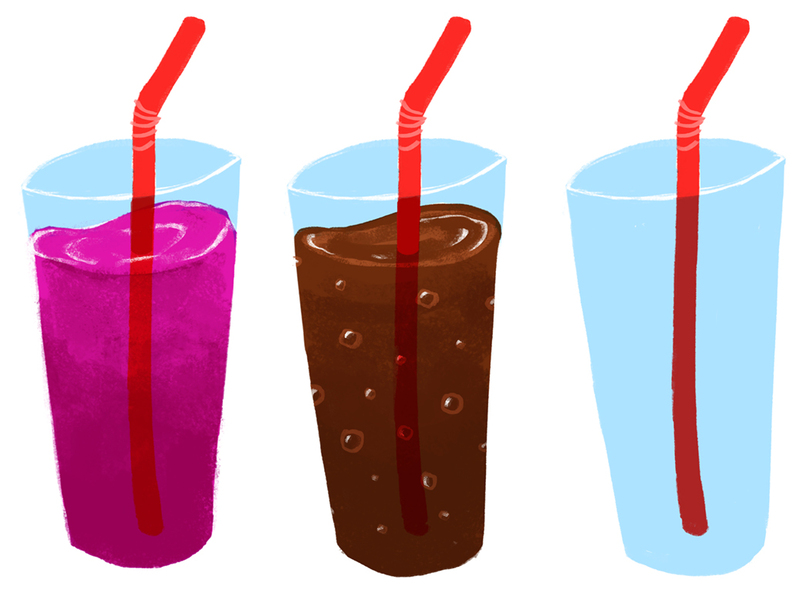How The University of California, San Francisco removed sugar and made things sweeter

The University of California, San Francisco has removed non-diet sodas and fruit juices with added sugars from campus vendors. Delaney Kuric | Head Illustrator
The University of California, San Francisco recently became the first college in the nation to fully eliminate drinks with added sugar from campus vendors.
Drinks with added caloric sugar were taken from the shelves, said Leeane Jensen, UCSF’s director of wellbeing. The school left drinks such as diet sodas and 100 percent fruit juice, but removed non-diet sodas and fruit juices with added sugars like cranberry juice cocktail, Jensen said.
The inspiration for the removal stemmed from one afternoon, when Laura Schmidt, professor of health policy at UCSF, left a seminar on the effects of sugar on health and saw a food court filled with obese patients and their families, with large sodas and sugary drinks in hand, all sold from UCSF vendors.
Schmidt texted UCSF’s chancellor and said she felt like a hypocrite.
“Why are we making profits off of products that we, as scientists, are saying are harmful to health?” Schmidt said. “We really need to change the environment if we want to change health.”
Schmidt and Jensen led the initiative to remove drinks with added sugar from UCSF’s campus.
People are still allowed to bring their own drinks with added sugar to campus and to the hospital, but on-campus vendors will no longer sell them, Jensen said.
“We can’t really rip things out of people’s hands when they’re at home or with their families and friends,” Jensen said, “But we certainly can model a healthy environment.”
School officials are being careful to ensure the removal of sugary drinks is called a “healthy beverage initiative,” rather than a ban, Jensen said. Calling it a ban would make people feel the school was constraining individual choice, she said.
The initiative was also voluntary. Even corporate vendors like Jamba Juice, Subway and Panda Express are participating in the initiative, Jensen added.
“There’s a pretty strong spirit of collaboration on this because it was voluntary,” Schmidt said.
Schmidt said she found that no vendors on campus are losing money and an on-campus survey showed an 80 percent approval rating in the first month of the removal.
Researchers at UCSF, including Schmidt, are measuring how removing sugary beverages from campuses affects the health of people who consume these beverages daily. They want to see if people are drinking or purchasing sugary drinks more often now that they aren’t offered at UCSF, Schmidt said.
The researchers will measure changes in body weight, BMI, cholesterol and blood sugar, Jensen said.
The effects of sugar, especially liquid sugar, on the human body are staggering, Schmidt said. She said the liver and pancreas take the hardest hits from added sugar in drinks. Drinking one can of soda a day is nearly the equivalent to the full dietary recommendation of sugar, Schmidt said.
Schmidt said there is research that shows how sugar can be addictive, but the addiction is “dose-dependent.”
UCSF hasn’t moved to ban sugar-laden foods as well because foods do not impact health as directly as drinks, Jensen said. Though some solid foods may have high sugar contents, they give organs more time to process the sugar, Schmidt explained.
Traditional methods of promoting wellness on campus were not working over the years, Jensen said. She found conventional wellness efforts like massages or lectures on healthy eating with nutritionists were ineffective and only bringing in about 10 students on average to each event.
“We worked so hard to get 10 people and we have 30,000 people on our campus each day,” between the campus and the hospital, Jensen said.
The most important thing to Schmidt was creating a culture of health at the university. She said it is imperative that UCSF stops selling products they know are harmful to health.
Jensen called the initiative to remove drinks with added sugar the next “low-hanging fruit” after tobacco, when it comes to public health.
“It’s pretty much what tobacco used to be before it became abnormal to smoke,” Jensen said.
UCSF is working with other UC schools as well as other universities around the world to integrate the initiative into their own campuses.
“This is how we can get critical food and beverage reform into places that matter,” Schmidt said.




